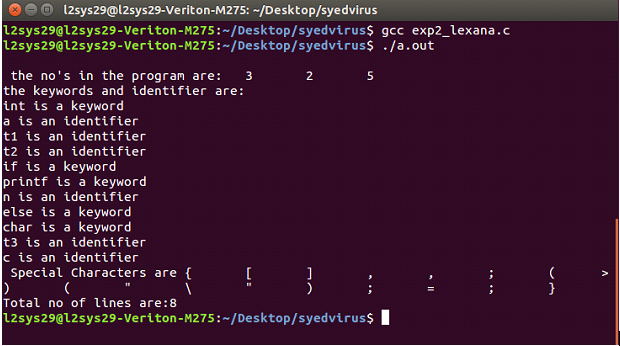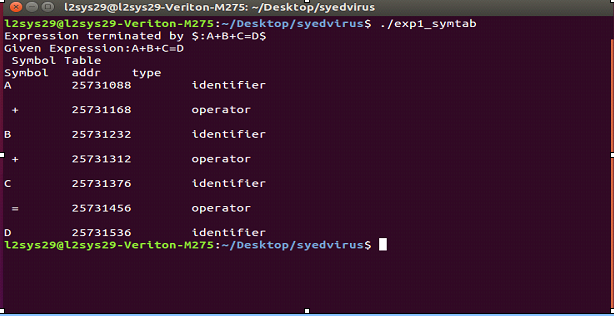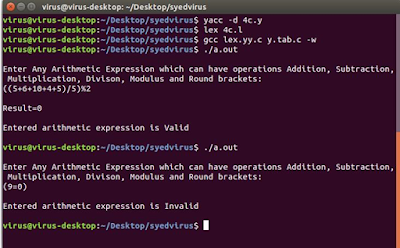DEVELOP A LEXICAL ANALYZER TO RECOGNIZE A FEW PATTERNS IN C( WITH OUTPUT)
AIM:
To develop a lexical analyzer to identify identifiers, constants, comments, operators etc using C program
ALGORITHM:
Step1: Start the program.
Step2: Declare all the variables and file pointers.
Step3: Display the input program.
Step4: Separate the keyword in the program and display it.
Step5: Display the header files of the input program
Step6: Separate the operators of the input program and display it.
Step7: Print the punctuation marks.
Step8: Print the constant that are present in input program.
Step9: Print the identifiers of the input program.
PROGRAM CODE:
//Develop a lexical analyzer to recognize a few patterns in C.
#include<string.h>
#include<ctype.h>
#include<stdio.h>
#include<stdlib.h>
void keyword(char str[10])
{
if(strcmp("for",str)==0||strcmp("while",str)==0||strcmp("do",str)==0||strcmp("int",str)==0||strcmp("float",str)==0||strcmp("char",str)==0||strcmp("double",str)==0||strcmp("printf",str)==0||strcmp("switch",str)==0||strcmp("case",str)==0)
printf("\n%s is a keyword",str);
else
printf("\n%s is an identifier",str);
}
void main()
{
FILE *f1,*f2,*f3;
char c,str[10],st1[10];
int num[100],lineno=0,tokenvalue=0,i=0,j=0,k=0;
f1=fopen("input","r");
f2=fopen("identifier","w");
f3=fopen("specialchar","w");
while((c=getc(f1))!=EOF)
{
if(isdigit(c))
{
tokenvalue=c-'0';
c=getc(f1);
while(isdigit(c))
{
tokenvalue*=10+c-'0';
c=getc(f1);
}
num[i++]=tokenvalue;
ungetc(c,f1);
}
else
if(isalpha(c))
{
putc(c,f2);
c=getc(f1);
while(isdigit(c)||isalpha(c)||c=='_'||c=='$')
{
putc(c,f2);
c=getc(f1);
}
putc(' ',f2);
ungetc(c,f1);
}
else
if(c==' '||c=='\t')
printf(" ");
else
if(c=='\n')
lineno++;
else
putc(c,f3);
}
fclose(f2);
fclose(f3);
fclose(f1);
printf("\n the no's in the program are:");
for(j=0;j<i;j++)
printf("\t%d",num[j]);
printf("\n");
f2=fopen("identifier","r");
k=0;
printf("the keywords and identifier are:");
while((c=getc(f2))!=EOF)
if(c!=' ')
str[k++]=c;
else
{
str[k]='\0';
keyword(str);
k=0;
}
fclose(f2);
f3=fopen("specialchar","r");
printf("\n Special Characters are");
while((c=getc(f3))!=EOF)
printf("\t%c",c);
printf("\n");
fclose(f3);
printf("Total no of lines are:%d",lineno);
}
#include<ctype.h>
#include<stdio.h>
#include<stdlib.h>
void keyword(char str[10])
{
if(strcmp("for",str)==0||strcmp("while",str)==0||strcmp("do",str)==0||strcmp("int",str)==0||strcmp("float",str)==0||strcmp("char",str)==0||strcmp("double",str)==0||strcmp("printf",str)==0||strcmp("switch",str)==0||strcmp("case",str)==0)
printf("\n%s is a keyword",str);
else
printf("\n%s is an identifier",str);
}
void main()
{
FILE *f1,*f2,*f3;
char c,str[10],st1[10];
int num[100],lineno=0,tokenvalue=0,i=0,j=0,k=0;
f1=fopen("input","r");
f2=fopen("identifier","w");
f3=fopen("specialchar","w");
while((c=getc(f1))!=EOF)
{
if(isdigit(c))
{
tokenvalue=c-'0';
c=getc(f1);
while(isdigit(c))
{
tokenvalue*=10+c-'0';
c=getc(f1);
}
num[i++]=tokenvalue;
ungetc(c,f1);
}
else
if(isalpha(c))
{
putc(c,f2);
c=getc(f1);
while(isdigit(c)||isalpha(c)||c=='_'||c=='$')
{
putc(c,f2);
c=getc(f1);
}
putc(' ',f2);
ungetc(c,f1);
}
else
if(c==' '||c=='\t')
printf(" ");
else
if(c=='\n')
lineno++;
else
putc(c,f3);
}
fclose(f2);
fclose(f3);
fclose(f1);
printf("\n the no's in the program are:");
for(j=0;j<i;j++)
printf("\t%d",num[j]);
printf("\n");
f2=fopen("identifier","r");
k=0;
printf("the keywords and identifier are:");
while((c=getc(f2))!=EOF)
if(c!=' ')
str[k++]=c;
else
{
str[k]='\0';
keyword(str);
k=0;
}
fclose(f2);
f3=fopen("specialchar","r");
printf("\n Special Characters are");
while((c=getc(f3))!=EOF)
printf("\t%c",c);
printf("\n");
fclose(f3);
printf("Total no of lines are:%d",lineno);
}
OUTPUT:
RESULT:
Thus the program for developing a lexical analyzer to recognize a few patterns in C has been executed successfully.




out put screen not appears for this program
ReplyDeleteI see that you have this lexer tutorial, and a symbol table one to follow. Do you have any plans to put out a parser tutorial without bison, flex?
ReplyDeleteThis comment has been removed by a blog administrator.
ReplyDeleteThis comment has been removed by the author.
DeleteMGM Springfield - Casino Vacation Rentals
ReplyDeleteFor your entertainment, 서귀포 출장안마 MGM 영천 출장마사지 Springfield has some of the 정읍 출장안마 best hotels, restaurants, 충청북도 출장안마 and 세종특별자치 출장안마 other amenities that we have on the market, including our Mohegan Sun